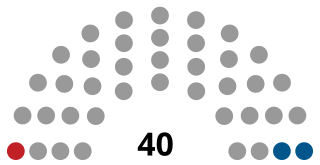
The politics of Ethiopia arise from the way the government of Ethiopia is structured as well as socioeconomic factors.
The politics of Iraq take place in a framework of a federal parliamentary representative democratic republic. It is a multi-party system whereby the executive power is exercised by the Prime Minister of the Council of Ministers as the head of government, as well as the President of Iraq, and legislative power is vested in the Council of Representatives and the Federation Council.

The Politics of Libya is in an uncertain state due to the collapse of the Libyan Arab Jamahiriya in 2011 and an ongoing civil war between the Council of Deputies in Tobruk and its supporters, the New General National Congress in Tripoli and its supporters, and various jihadists and tribal elements controlling parts of the country.

Politics of Bahrain takes place since 2002 in a framework of a constitutional monarchy where the government is appointed by the King of Bahrain, King Hamad bin Isa Al Khalifa. The head of the government since 1971 is Prime Minister Prince Khalifa bin Salman Al Khalifa and the Crown Prince is Prince Salman bin Hamad Al Khalifa, who serves as Commander of the Bahrain Defence Force. The parliament is a bi-cameral legislature, with the Chamber of Deputies elected by universal suffrage, and the Shura Council appointed directly by the king. MP Khalifa Al Dhahrani is the Speaker of Parliament.

Indonesia held legislative elections on 5 April 2004 for both houses of the People's Consultative Assembly, the country's national legislature. This included all 550 seats in the People's Representative Council and 128 seats of the new Regional Representative Council.

The Parliament of Pakistan is the federal and supreme legislative body of Pakistan. It is a bicameral federal legislature that consists of the Senate as the upper house and the National Assembly, as the lower house. According to the constitution of Islamic Republic of Pakistan, the President of Pakistan is also a component of the Parliament. The National Assembly is elected for a five-year term on the basis of adult franchise and one-man one-vote. The tenure of a Member of the National Assembly is for the duration of the house, or sooner, in case the Member dies or resigns. The tenure of the National Assembly also comes to an end if dissolved on the advice of the Prime Minister or by the president in his discretion under the Constitution.

The National Assembly is bicameral with the lower house, the Chamber of Deputies, having 40 members elected in single-seat constituencies for a four-year term. The upper house, the Shura Council, has 40 members appointed by the King of Bahrain, with the stated aim of giving a voice to minority communities and technocratic experts within the legislative process. Supporters of the system refer to long established democracies the United Kingdom and Canada operating with this bicameralism with an appointed upper chamber and an elected lower chamber. Opponents of this system point out that unlike the bicameral systems in the UK and Canada, the Bahraini system gives the unelected upper house equal or more legislative power than the elected lower house, allowing the King to control all legislation. Opponents also point out that the current system was imposed unilaterally by the King, violating the 1973 Constitution and a 2001 signed agreement with the Bahraini opposition.

Elections in Benin take place within the framework of a multi-party democracy and a presidential system. Both the President and the National Assembly are directly elected by voters, with elections organised by the Autonomous National Electoral Commission (CENA).

Elections in Kuwait are held for both the National Assembly and for the Municipality. Kuwait's constitution calls for elections to the unicameral National Assembly at a maximum interval of four years. Elections are held earlier if the Constitutional Court or Emir dissolve the parliament.

Women's rights have been a cornerstone of the political reforms initiated by King Hamad, with women gaining the right to vote and stand as candidates in national elections for the first time after the constitution was amended in 2002. The extension of equal political rights has been accompanied by a conscious drive to promote women to positions of authority within government.

The Consultative Council is the name given to the upper house of the National Assembly, the main legislative body of Bahrain.

Parliamentary life in Egypt has been a mark of Egyptian civilizations along its history. In modern history, parliamentary life started as early as 1824 while representative parliamentary life did not start until 1866. In 2016, Egypt celebrated the 150th anniversary of Parliamentary life in their country.

Women candidates of the 2006 Bahrain election, which took place on the November 25, 2006 were reported to have received numerous threats from Islamic salafist and other factions to prevent them taking part. In all, eighteen female candidates of various political stances and views took part after recent changes to the political system in 2001 allowed women to not only become candidates, but also gave them the right to vote.

General elections were held in Bahrain on 25 November 2006 for the 40-seat Council of Representatives alongside municipal elections. There was a 72% turnout in the first round of polling. As expected by most observers, Shi'a and Sunni Islamists dominated the poll, winning a clean sweep in the first round of voting, while liberal and ex-communist MPs lost all their seats. Four candidates of the left-wing National Democratic Action made it through to second round run-off which was held on 2 December 2006.

General elections were held in Bahrain for the first time on 12 December 1973. 30 seats out of the 44-seated unicameral National Assembly were contested, the other 14 were ex officio. Of the 24,883 registered voters, 19,509 cast a ballot, giving a voter turnout of 78.4%.

General elections were held in Bahrain on 22 November 2014, with a second round on 29 November in constituencies where no candidate received at least 50% of the vote. The elections were boycotted by the Shiite Islamist opposition. The government announced the voter turnout as 52.6%, although the opposition claimed it was only 30%.














